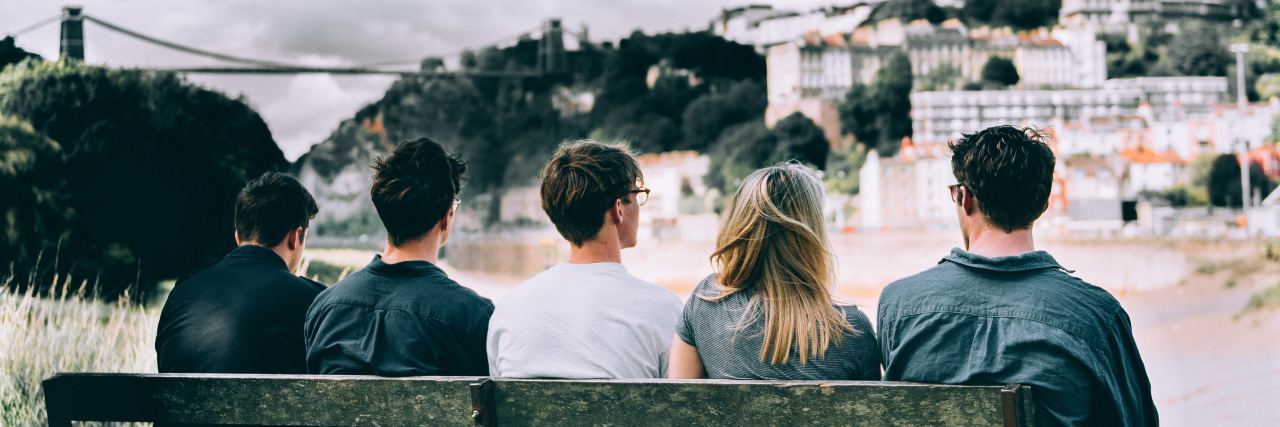It was a November evening in Montreal, during the time of year when the leaves have all fallen and the snow has not yet come to cover the grey of the sidewalks. Standing, looking at the door of this small office, my gaze was lost on the sign indicating the Zero Phobia support group meeting. At that moment, I swallowed my pride and told myself, “OK, this is where I have ended up…”
I opened the door without high hopes for the future and without really knowing what would happen to me. The only thing I was sure of was that there was no future for me in my current circumstance. I knew the road I was following by heart in all its twists and turns, and it was leading me nowhere. Always the same routine — the same anxiety that follows you like a shadow. So why not try something else? I had already tried so many things.
As I entered the office, what struck me right away was the number of shoes in the entranceway. Because one of the words that comes up often in peoples’ stories is solitude. Solitude because they might not want to bother anyone. Solitude because they might be unable to reach out. Solitude because they might be embarrassed about who they are, what they feel. Solitude by avoidance.
So many of us are trapped in this vicious circle that we each try in our own way and rhythm to break. Avoidance is one of the pitfalls that some of us might hit. It is a very sly friend — it can comfort you in the moment and allows you to reduce your anxiety, but in reality, I think it keeps you in servitude, gradually reducing your freedom.
This is why I think the strength of a group, like Zero Phobia, is so important. The feeling of belonging, once a week, to a group that understands you, does not judge you and provides you with support. Just by being there with other people lets you know that you exist and are not alone in this labyrinth. And vice versa — by being there, we can exercise our empathy for others.
People sometimes surprise themselves by being more gentle and understanding toward other people than they are to themselves. But this is because those struggling might be quick to attack themselves. Self-denigration and self-doubt act as weapons of psychological torture.
Today, like so many before me who have come through these doors, I have become a peer support volunteer for Zero Phobia. On that November evening, I never thought I would find myself “on the other side” a year and a half later. Despite living with social anxiety, today I realize that I like animating groups and accompanying people on their path.
And there is a beauty in all the people who come through the doors for the Zero Phobia meetings. They are on a journey, sometimes without knowing it. When others come, they are not always aware of the whole road they have taken to get to us: research on the Internet, looking up the address, reflecting (sometimes for several months) before deciding to actually come. We pose so many questions on our way to the first meeting: Will I be OK? Why am I going? Is it really worth it? Will I be judged?
They might be looking for solutions, tools, or they’re just tired of their situation. There is always something that drives someone to come through those doors — hope for getting better, but at the same time the loss of hope — even if they don’t know where this will take them. It can be easy to get stuck between being discouraged and wanting to feel better.
There is also the satisfaction of seeing young people come to our meetings, sometimes with their parents, brothers or sisters. If I had these resources in my era, I surely would have spent less time meandering and lost in the vicissitudes of my thoughts.
Thoughts. Another word that comes back often. Thoughts that can be obsessive, that can occupy hours of your days and nights, that might not end, that make you believe you’re “crazy.” It might seem easier to unplug your brains, or unplug you entirely…
It’s easy to feel discouraged when anxiety feels like a mountain too big to climb. I’m now trying to go one step at a time, no matter how small. I call this my “benevolent perseverance.”
It is 9:30 p.m. on a beautiful January evening. The Zero Phobia meeting is done. Some people chat outside the building to continue sharing. I take the metro, satisfied with my evening. It has not been perfect, but that has to be accepted. That is what is also difficult to tame: releasing this quasi-obsessive pursuit of perfection and control, which is what keeps me from enjoying life as it is.
But no matter what, I think it’s so important to always remember that you are not your anxiety or depression, and you are not alone.
Follow this journey here.
If you or someone you know needs help, visit our suicide prevention resources page.
If you need support right now, call the National Suicide Prevention Lifeline at 1-800-273-8255, the Trevor Project at 1-866-488-7386 or text “HOME” to 741-741. Head here for a list of crisis centers around the world.
We want to hear your story. Become a Mighty contributor here.
Unsplash photo via Matthew Gerrard

